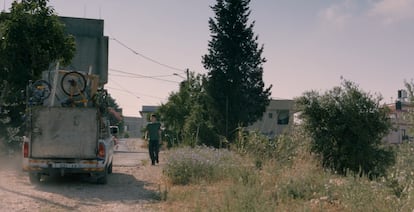The Minister of Culture of Israel, Miki Zohar, announced on Wednesday that it will cut the financing to the ceremony for the delivery of the AU Awards, the national equivalent to the Oscars or the Goya, after having awarded this year the award for the best feature film to The sea. It is an Israeli-Palestinian co-production that tells the adventures of a West Bank-territory that Israel has maintained under military occupation for seven decades-to illegally cross Tel Aviv and see the sea for the first time in his life. The film, which the minister has described as “scandalous”, will represent Israel in the Oscar of Hollywood. The ceremony in which he was awarded, this Tuesday, was remarkably political, with speeches against Gaza’s invasion (just when Israel has launched the conquest of the capital to destroy it completely) and dozens t -shirts among the attendees with slogans like “a child is a child” (in Arabic and Hebrew), “let’s stop the war” and “all home, now”, in support of an agreement with Hamás of the last 48 Israeli hostages in Gaza.
“From the budget of 2026 onwards, this pathetic ceremony will not be funded by taxpayers,” Zohar warned in a statement released by culture. “During my term, the citizens of Israel will not pay for a shameful film event that spits on the faces of our soldiers.” The minister belongs to Likud, the right -wing party led by Prime Minister, Benjamín Netanyahu, who governs in coalition with extreme nationalism and with the parties that defend the interests of the Jewish ultra -orthodox collective.
Directed by the Israeli filmmaker Shai Carmeli Pollak (who won the Prize for Best Original Screenplay and dedicated it to a friend who has survived an Israeli bombing in Gaza), the film barely “spits on the faces” of the Israeli soldiers because they almost does not appear, but critically portrays the reality of the occupation and Israeli society, while the identical tenderness shared by Jewish and Arab children.
“Dark days”
The producer, Baher Agbariya, thanked such a “sample of confidence”, that “it should not be taken for granted on dark days like this, in which the war and the noise of weapons try to silence the human voice.” The film, he said, is born from “love to humanity” and has as a message “the right of any child to live in peace, without fear or war.” “We are all the same,” he said before dedicating the prize to all who believe that peace: “It is not an illusion, but an election here and now.”
Throughout an hour and a half shot in Arabic and Hebrew, the film leads to the big screen the dissonance between the reality of the Palestinians of the West Bank (the control stalls, the military permits system or how the construction pawns risk their life for crossing the separation wall to do the work that they cannot obtain in their strangulated economy) and the Israel portrayed as people unable to form a phrase in Arabic, who carry a rifle and a vegan plate in the uniform that are wrapped during mandatory military service or who observe sitting on the terrace of a cafeteria the arrest of two Palestinians before receiving, as if nothing, a cappuino with soy milk.
The protagonist, Jaled, a 13 -year -old boy, is the only one in a school excursion who stays without seeing the sea for the first time because he lacks permission from the Israeli military authorities, apparently for having participated in a demonstration. It embodies it with great credibility the Palestinian Muhammad Gazawi, who took the best interpreter. When climbing on the stage, he spoke in Arabic, a language that practically no one in the public understood and that many Jewish Israeli associate – automatic and viscerally – to the enemy, to ask that all children in the world have “the same opportunity: they live and dream without wars”. No one so young had received the award before and received a long applause.
The film has not liked the Minister of Netanyahu. “Reproduce,” complained last month, the “narrative” of Israel’s “enemies” while their “soldiers fight in the front.” Sources from his ministry cited by Israeli Public Radiotelevisión say that Zohar has not seen the film, projected on Wednesday before dozens of people in the smallest room of the cinematheque in Jerusalem.
The Ofir are delivered since 1990 and are organized by the Israeli Film and Television Academy. The winter as the best film automatically becomes Israel’s candidate to the Oscars in the category of Best Foreign Film.
A particularly emotional moment was the speech between tears of Uri Barbe, author in 1984 of After the barsone of the most interesting feature films of Israeli cinema and that slipped among the Oscar nominated for best foreign film. “The holiness of life and the obligation to save them cannot have borders: neither ethnic, nor geographical,” he said after receiving a long and excited applause when charging against the Minister of Culture who has just withdrawn the funds to the ceremony.
The minister has spent the congratulations he has received for his decision from the ranks on the right on Wednesday. Amichai Chikli, the diaspora minister and fight against anti -Semitism close to Santiago Abascal (participated in an act of Vox in Madrid), considered the “very important” decision. “It is unthinkable that, after all that has been Israel since the (Hamás del) October 7 (2023) and in the midst of a difficult war, taxpayers are required to participate in the financing of Palestinian propaganda.” Or the Im Tirtzu ultra -nationalist organization, which celebrates that “Israeli citizens do not finance with their taxes” an academy of cinema and television that “rewards antiisraeli films in times of war.” “Whoever wants to distribute prizes and money to those who hate Israel should do it from their own pocket,” he added.

